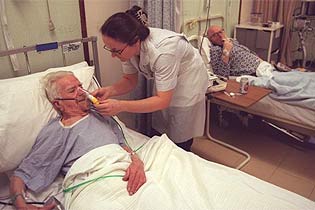|
|
New
Nurse Guidelines to Protect the Elderly
By Linda Summerhayes, Scotsman.com
UK
December
12, 2005

Robert
Perry
The new NHS nursing standards put greater emphasis on patients' cleanliness and comfort.
The NHS today published new guidelines to improve the care of elderly patients in hospitals.
The move comes eight months after the Evening News launched a campaign calling for better care for the elderly following the deaths of two pensioners from "neglect" in a Lothian hospital.
Our campaign prompted health bosses at the ERI to review their procedures surrounding the treatment and care of frail older patients.
Today's national standards reinforce the need to protect the dignity of elderly patients and ensure they are subject to more stringent health checks.
Hospital nurses and care home workers will be given the new guidelines in a bid by health chiefs to stave off the growing number of complaints by relatives that elderly patients are being neglected.
The move follows a high-profile campaign by the Evening News after former Lord Provost Norman Irons claimed his mother was killed by neglect at the ERI.
Anne Irons, 89, died at the Astley Ainslie Hospital in April having spent 28 days in the flagship hospital.
Mr Irons branded the care his mother received on the hospital's orthopaedic ward "a disgrace in a developed Western country".
In a scathing letter to Brian Cavanagh, chairman of NHS Lothian, he alleged "basic neglect" at the ERI. By contrast, he said the care she received at the Astley Ainslie, where she died, was "exemplary".
Health chiefs launched a task force seeking to improve conditions on the ERI wards and a care team was employed to look after elderly patients.
An independent investigation into care standards at the hospital was also launched.
It is hoped the new measures will prevent infections and bed sores by ensuring staff give more consideration to a patient's cleanliness and comfort.
The standards were expected to be launched by NHS Quality Improvement Scotland at an event in the Capital today.
Jan Warner, NHS director of performance assessment and practice development, said: "There has been considerable public concern over what are sometimes called 'dignity issues' in the care of older patients.
"What are perceived as relatively simple issues, such as cleaning patients' teeth or supporting them in remaining physically active, can be quite complex when the patient is frail.
"The new guidance is designed to help nurses deliver the care we would all want to receive in our senior years."
Hospital bosses say nurses have a key role in promoting good oral health, which is essential for a person's wellbeing, general health and ability to eat.
And they want nurses to overcome the perception that "caring for a person's mouth is difficult, distressing and intrusive".
The NHS said it wants staff to be aware of the link between oral infection and pneumonia, as well as the inability to eat.
In future, nurses will have to screen patients to determine the risk of mouth infection as well as ask them how they feel about their general health.
They will have to encourage older people to drink at least 1.5 litres of fluid a day and will need to complete records to ensure the patient is drinking enough.
Nurses should assess how likely a patient is to develop bed sores - especially elderly people being cared for in the community.
The document also orders that nurses play a key role in promoting physical activity in older people, even among those who have dementia, or are chronically ill or frail.
It also states that even though more than 60 per cent of people over the age of 70 have difficulty hearing, health professionals often fail to take this into account.
Nurses and care staff will now have to ensure that information is clearly available to older people with communication problems and that they take the time to interact with these patients.
NHS QIS also wants to see education and training programmes put in place to ensure nurses are aware of their responsibilities.
NHS Lothian has reviewed its care of the elderly procedures since Mr Irons complained about the treatment his mother received at Edinburgh Royal Infirmary.
Retired teacher Annette Morrison also complained that her 91-year-old mother Prudence Dick "starved to death" while in the same ward at the hospital.
Following the complaints, an independent inquiry, chaired by Scotland's former Chief Nursing Officer, Anne Jarvie, was set up and is due to report on its findings early next year.
Libby Campbell, associate director of nursing at NHS Lothian's University Hospitals Division said: "We welcome these new guidelines on standards of care for elderly patients.
"We have already undertaken a great deal of work to enhance services for elderly patients and these further recommendations will be used to consolidate the many developments already under way."
|
|



